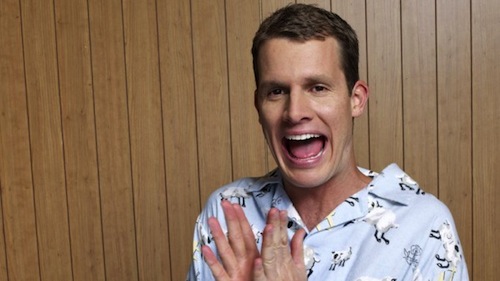I’m not certain what it says about us, but this is not the first time we have talked about rape jokes. By now you have probably heard about Daniel Tosh, who responded to a woman who shouted out, “actually, rape is never funny” during one of his stand-up shows with “wouldn’t it be funny if five guys raped her right now?” That’s what we call a First Idea. Tosh can be forgiven his mediocre ad lib, but he can also be taken to task for promoting a rape culture. The internet is pretty much divided on which to do. Careful thinker and talented jokewright Carolyn Jacobson sent me this link considering that there may be a middle ground between “anything is funny” and “some things are never funny.” Its sentiments are eerily reflected in this one. While you read those, I’ll just think about the summer I spent at Boy Scout ca—no! No I won’t!
See, that’s a lazy rape joke, right there. Compare to this brief bit on rape from the master Sarah Silverman, coincidentally performed around the same time as Tosh’s:
httpv://www.youtube.com/watch?v=P5IoKVHNXmI
There’s a crucial difference between these two kinds of rape jokes: Silverman’s are funny. You can argue that hers are better because they draw attention to the problem of rape underreporting, or because they indict the absurdity of victim-blaming, or even because Silverman is a captivating siren woman. But the real reason is simpler: very few good jokes start out with wouldn’t it be funny if… It’s the same reason Monet’s Water Lilies does not include a bunch of people in the foreground admiring the water lilies.
“But wait,” you say, lost for a moment in my piercing blue eyes, “that’s an aesthetic judgment, and we’re talking about a moral issue.” You are correct. It seems tenuous to claim that many jokes are unethical because they hurt victims’ feelings or condone rape, but some are okay because they’re hilarious. No amount of beauty—here I use beauty in its strict philosophical sense, meaning everything that is awesome—can justify unethical behavior. Otherwise we run the risk of beautiful murder or beautiful theft. To borrow from Stephen Jay Gould, aesthetics and ethics are non-overlapping magisteria.
Except, I submit, in jokes. Viewed in ethical terms, a large number of jokes that no one considers offensive become horrifying. Take my wife….please is predicated on the idea that Henny Youngman’s marriage is so loveless and daunting that he wants to unload her as chattel. The Jerk is about one man’s losing struggle with mental retardation. As drama, these works are unacceptable. Because they are funny, though, we do not care about their premises, the messages they superficially convey.
That might be because sad marriages and dumb people are not such horrifying social problems as rape, but I suspect not. The mind does not execute such calculus in the space of a punchline. Instead, I cite the old axiom it’s funny because it’s true. True things are ethically okay to talk about no matter how unpleasant we find them. Don’t talk about executing six million fat people, because that would be awful. Do talk about Hitler’s execution of six million Jews, because that shit actually happened. When Silverman says that rape victims are unlikely to complain about jokes because, statistically, they don’t even complain about rape, she travels via absurdity to arrive at the truth.
Which brings us back to Daniel Tosh. Wouldn’t it be funny if five guys raped her right now? is not a good joke because it isn’t true. Obviously it is not literally true, but it is also not truthful in the sense that such direct applications of half-assed irony are often not funny. Perhaps the first time a wealthy dowager caught a pie in the face it said something about the human condition, but now it just says something about how hacks make jokes. The irony-of-opposites joke construction is tired, and we know it to be tired because we’ve seen it applied so ubiquitously that we have also seen it fail again and again.
I think that may tell us something about why a funny rape joke is okay and a lame one is not. One tells the truth, no matter how awful, and the other lunges for the awful as a substitute for funny/true. I also think that we have taken 700 words to find a connection between ethics and aesthetics that Keats articulated in fifty lines. But Keats is dead and I have an iPhone, so who’s smart now?





Awesome.
Imagine, though, if a man said Silverman’s jokes. Her jokes would still be funny, but people would have a harder time getting there because they wouldn’t trust him. Since Silverman’s a woman, it’s easier for folks to assume that deep down Silverman doesn’t really blame rape victims, and appreciate the truth/cosmic horror/laughs.
Dear sir Nigel,
I liked the article. Not sure about this part though…
“Don’t talk about executing six million fat people, because that would be awful. Do talk about Hitler’s execution of six million Jews, because that shit actually happened.”
Just because something happened, therefore “it’s true,” doesn’t make it pass over to the side of “permissibly funny to talk about.” Otherwise, we can joke about a specific rape, ie “haha, sandy got raped” (because “it’s true”) but we can’t joke about rape in general.
That’s a good point, Jason. If we were to draw a Venn diagram with the regions “okay to talk about,” “not okay,” “true” and “funny,” the last two would not overlap completely. What happened to Sandy at Dave & Buster’s is a good example. Maybe “it’s funny because it’s true” only applies to the abstract, not the personal. The comic who wrote the first of the links Carolyn sent me makes a similar argument.
Who is Sir Nigel? He sounds handsome.
Lol
In answer to your question: not you.
Who’s smart now? Not you.
Hope that helps!
You’re welcome